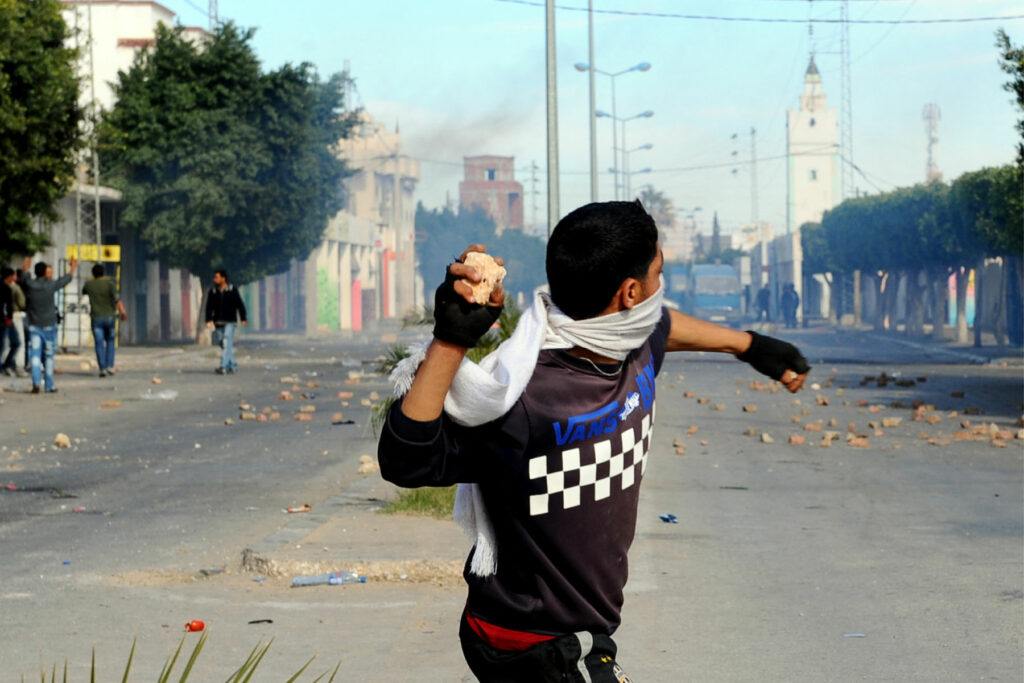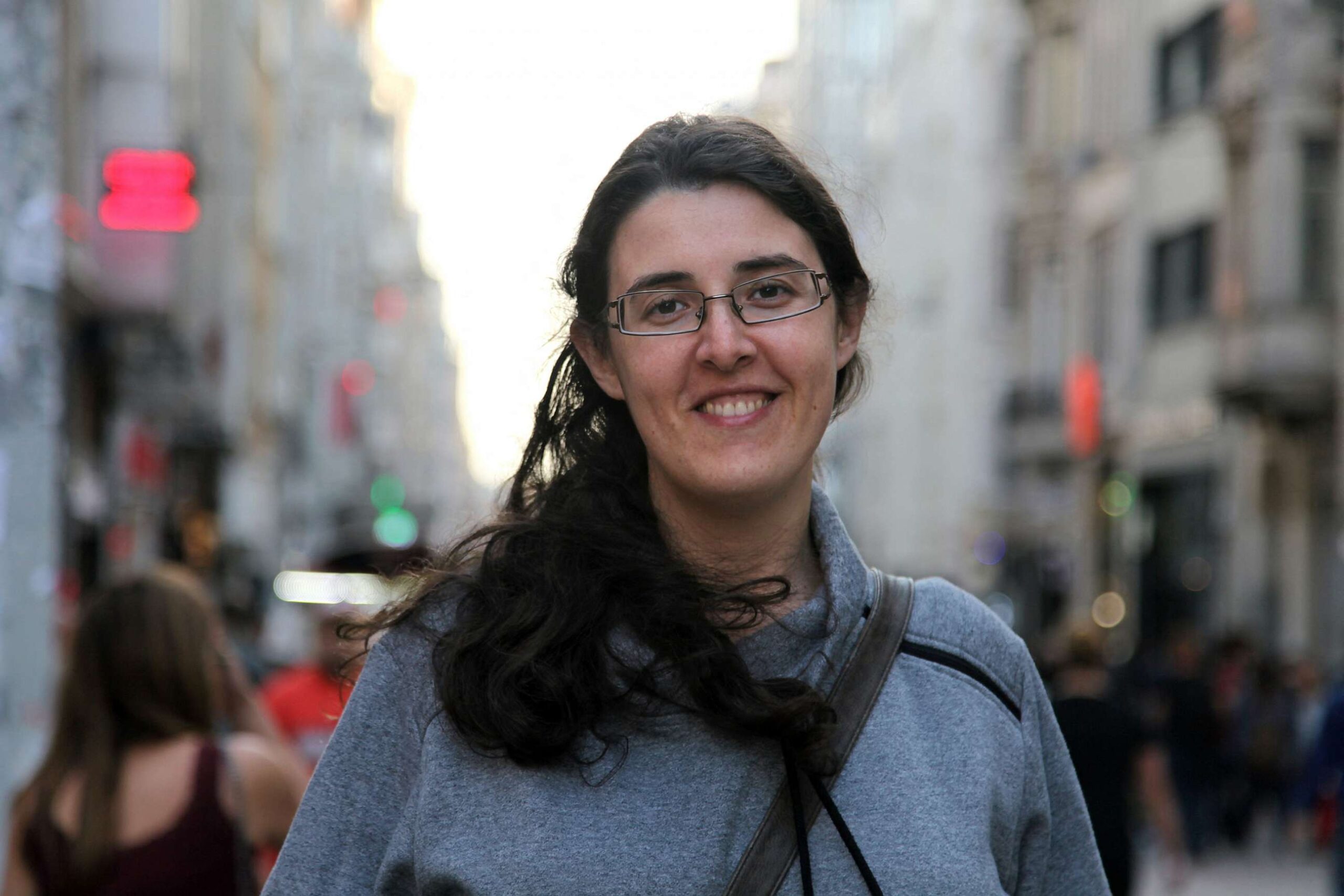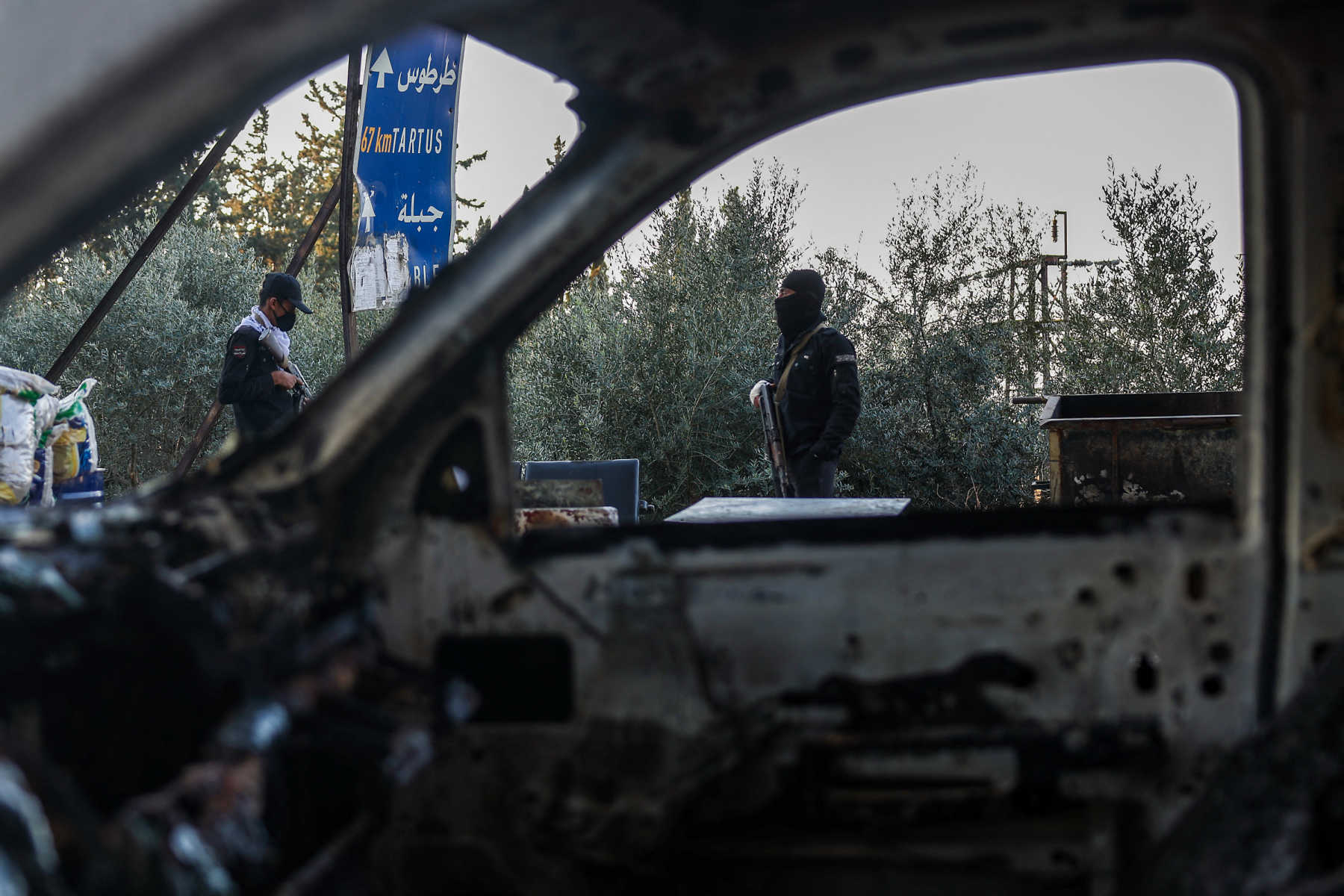Hammadi Khlifi is a Tunisian human rights advocate and novelist based in New York.
December 19, 2010. The first night of terror.
I attempted to reach Sidi Bouzid that day any way possible. The drivers of the large, red-striped louage—shared taxi vans—refused to go to the city after hearing of the violence there. Helpless, I stood at the bus station in Sfax alongside dozens of locals who wanted to return to their remote city nestled among the mountains. Suddenly, a horrifying voice echoed through the loudspeaker: "Those who want to go to Sidi Bouzid must board the next Gafsa bus now!"
The situation turned hostile, and the crowd of people stranded in Sfax piled into the already-packed, dilapidated bus to Gafsa. Passengers glared at us as we squeezed into the few spaces left on old, worn-out seats.
I placed my backpack on the floor, wedging it among the other passengers. The bus lurched forward, and we breathed a sigh of relief, thanking our luck for finding a seat on the journey back.
Tense conversations filled the bus, blending with the radio playing in the background—no news of any sort, just muffled, monotonous music seeping into everyone while they talked about the young man who had set himself on fire in my hometown, the burning car tires on the road, and how the youth of the Ennour al-Gharbi neighborhood had attacked a police car with stones. Adrenaline surged through me as I imagined it all. Were we heading into a war zone?
We weren't just protesters back then; we were rebels, true fighters with grand dreams—dreams that have all vanished today under Saied.
- Hammadi Khlifi
Fear seemed to grip the bus driver, speaking on his mobile phone as we approached Sidi Bouzid, before he ultimately decided to change the destination and bypass the city's bus station. Protests and shouts erupted from the passengers: How would we return to our homes now?
We were left in the village of Esouda, all of us disembarking without knowing what to do next. Anger mixed with confusion as people started calling their families and heading toward the rural transport trucks for a possible ride.
I called my friend Gaith; I had no other solution. I waited for an hour until I saw him in the distance, happily riding his motorcycle as if nothing was happening at all.
I hopped on the back; there was no time for philosophical discussions or pondering over anything. We drove on to Sidi Bouzid, where everything turned stark when we entered the city through its main street, defying numerous police barricades.
The scene was terrifying, with dozens of buses from the internal security forces, thousands of police officers and special National Guard units, and fires raging over rubber tires. A giant poster of President Zine El Abidine Ben Ali, which had always stood like a menacing observer, was torn in half.
I was afraid, yet excited.
Sidi Bouzid was like a parallel reality, a place where we had all collectively agreed to engage in a full-fledged battle with the police. I saw dozens of childhood friends, and I began to recognize humanity through their eyes. Everyone covered their faces with shields or masks to protect their identities and guard from the tear gas, whose canisters turned into bullets when the police fired them directly at protesters. Our weapons were rocks and a few Molotov cocktails made by the elders of the neighborhoods from beer bottles and notebook paper.

I still remember everything as if it happened yesterday—the sound of gunfire, the roar of tear gas, the hostility of the police and security units as they occupied entire neighborhoods and targeted their residents, launching tear gas canisters into every house. Our defense mechanisms evolved every day, to the point where we fashioned barricades out of wheels, barrels and sandbags at the entrance of every neighborhood.
The youth were divided into teams. Scouting teams were mainly composed of children under the age of 16, so they wouldn't be directly attacked by the police. But there were also teams of stone-throwers and defenders armed with Molotov cocktails, positioned on the rooftops of houses and low buildings. When the security units charged through in their armored vehicles, or on the massive motorcycles that we saw for the first time in our lives, we set one of them on fire and danced around it while the flames consumed it, as if we were celebrating a great triumph. But it was only a small victory.
We were besieged in our neighborhood more than once, and each time, we thought it was the terrifying moment of our arrest, or worse. Once, the questions overwhelmed my mind, and I threw one of them at a fellow protester's face: "Why did we do all this? What's the point?"
"What's the point?" he shouted. "I want Sidi Bouzid to become New York City!"
How easy it is for a dream to turn into a nightmare, a revolution into a graveyard and victory into bitter defeat.
- Hammadi Khlifi
I'll never forget this phrase. I stood today smoking a cheap cigarette outside a subway station in Brooklyn, watching President Kais Saied destroy everything in Tunisia at the speed of light through my phone's screen. Mass arrests, the dissolution of institutions, the degradation of a steadily debased political scene since he seized power in his "self-coup" nearly two years ago. I imagined that dream of my protesting friend, who died a few days after the revolution in a random motorcycle accident, of making Sidi Bouzid—the city of hailstorms, rocks and high skies—like New York City—the city of glass and steel and asphalt. I look at the sky now, wishing that New York could become Sidi Bouzid, even if only for an hour, with all its clarity, tranquility and dreams.
I remember all the protesters. We weren't just protesters back then; we were rebels, true fighters with grand dreams—dreams that have all vanished today under Saied. Many of those rebels went on parallel paths: Some died in the hell of Syria, others died in the hell of the sea, dreaming of reaching Italy, and some died in remote, forgotten cafes. Some died in prisons, others in their homes, and some on the thresholds of institutions in a country experiencing clinical death.
I still feel regret, remorse and pain that all those dreams, all that euphoria, dissipated. Even my various attempts to document the revolution in 2011 through cellphone videos were shattered when one protester refused to give me back my phone before deleting them all, fearing his identity would be revealed and he would be arrested.
How easy it is for a dream to turn into a nightmare, a revolution into a graveyard and victory into bitter defeat. The past, filled with our dreams, has become a despised tale that everyone in Tunisia now avoids even mentioning. People whisper again in cafes instead of shouting. They won't talk about politics under the shadow of Tunisia's new dictator, Kais Saied.
I wish I could ask my protesting friend the same question again. Why did we do all this? What was the point? Will we ever go back to those days in Sidi Bouzid?
















![Security forces loyal to the interim Syrian government stand guard at a checkpoint previously held by supporters of deposed president Bashar al-Assad, in the town of Hmeimim, in the coastal province of Latakia, on March 11, 2025. Syria's new authorities announced on March 10, the end of an operation against loyalists of deposed president Bashar al-Assad, after a war monitor reported more than 1,000 civilians killed in the worst violence since his overthrow. The Syrian Observatory for Human Rights said the overwhelming majority of the 1,068 civilians killed since March 6, were members of the Alawite minority who were executed by the security forces or allied groups. (Photo by OMAR HAJ KADOUR / AFP) / “The erroneous mention[s] appearing in the metadata of this photo by OMAR HAJ KADOUR has been modified in AFP systems in the following manner: [Hmeimim] instead of [Ayn Shiqaq]. Please immediately remove the erroneous mention[s] from all your online services and delete it (them) from your servers. If you have been authorized by AFP to distribute it (them) to third parties, please ensure that the same actions are carried out by them. Failure to promptly comply with these instructions will entail liability on your part for any continued or post notification usage. Therefore we thank you very much for all your attention and prompt action. We are sorry for the inconvenience this notification may cause and remain at your disposal for any further information you may require.”](https://dawnmena.org/wp-content/uploads/2025/04/syria-22039885951-350x250.jpg)










![Security forces loyal to the interim Syrian government stand guard at a checkpoint previously held by supporters of deposed president Bashar al-Assad, in the town of Hmeimim, in the coastal province of Latakia, on March 11, 2025. Syria's new authorities announced on March 10, the end of an operation against loyalists of deposed president Bashar al-Assad, after a war monitor reported more than 1,000 civilians killed in the worst violence since his overthrow. The Syrian Observatory for Human Rights said the overwhelming majority of the 1,068 civilians killed since March 6, were members of the Alawite minority who were executed by the security forces or allied groups. (Photo by OMAR HAJ KADOUR / AFP) / “The erroneous mention[s] appearing in the metadata of this photo by OMAR HAJ KADOUR has been modified in AFP systems in the following manner: [Hmeimim] instead of [Ayn Shiqaq]. Please immediately remove the erroneous mention[s] from all your online services and delete it (them) from your servers. If you have been authorized by AFP to distribute it (them) to third parties, please ensure that the same actions are carried out by them. Failure to promptly comply with these instructions will entail liability on your part for any continued or post notification usage. Therefore we thank you very much for all your attention and prompt action. We are sorry for the inconvenience this notification may cause and remain at your disposal for any further information you may require.”](https://dawnmena.org/wp-content/uploads/2025/04/syria-22039885951-360x180.jpg)









